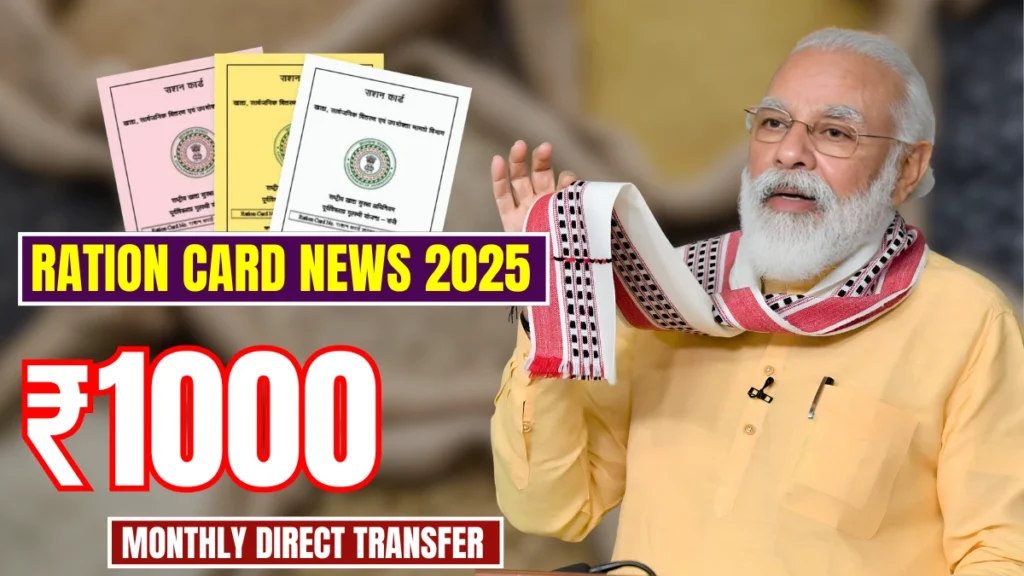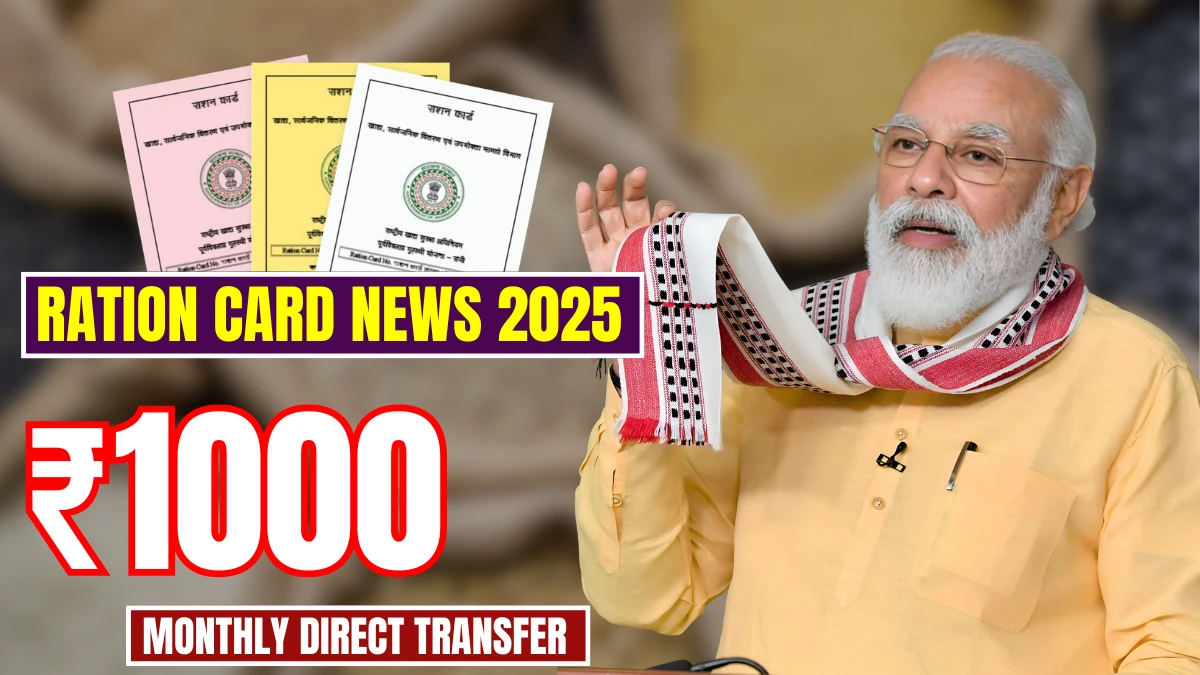The Ration Card system in India is undergoing a significant overhaul in 2025. The government is introducing new reforms that are set to benefit millions of families across the country. These changes aim to reduce poverty, provide financial relief, and improve the overall quality of life for families who rely on government support.
Among the major improvements is the ₹1000 monthly direct transfer, a change that promises to transform the lives of low-income families. Additionally, there are several new benefits that ensure comprehensive welfare for households in need.

₹1000 Monthly Direct Transfer: A Game Changer
One of the most anticipated features of the Ration Card 2025 initiative is the introduction of a ₹1000 monthly direct transfer. This will be credited directly into the bank accounts of eligible families, providing a reliable source of financial assistance. With the rising cost of living and inflation, this monthly amount will help ease financial stress and ensure that basic needs are met.
The direct transfer will eliminate middlemen and reduce delays, ensuring that the funds reach the right people without obstruction. This measure is designed to foster transparency and accountability in the distribution of government funds.
Enhanced Food Supply and Subsidies
In addition to the monthly cash transfer, families will benefit from an increased food supply under the Ration Card system. The government has pledged to provide larger quantities of essential food grains like rice, wheat, and pulses to eligible households. This increase in food distribution aims to reduce grocery bills and ensure that families don’t go hungry due to financial constraints.
The food grains provided will be of higher nutritional value, which will directly improve the health and well-being of families. The government is also focusing on providing fortified food to combat malnutrition, particularly in rural areas where health infrastructure is often lacking.
Free Healthcare and Medical Benefits
The Ration Card 2025 reforms also bring free healthcare benefits to families. Eligible households will have access to government hospitals without the worry of expensive medical bills. Critical illnesses, essential treatments, and medications will be provided at no cost, ensuring that no family member is left behind in the face of health crises.
In addition to treatment, preventive healthcare services will be extended to ration cardholders. Vaccinations and regular health check-ups will become accessible to help families stay healthy and prevent the spread of diseases in vulnerable communities.
Educational Benefits for Children
Education is a critical tool for upward mobility, and the government’s new reforms include educational subsidies for children in Ration Card households. These subsidies will cover the cost of school fees, uniforms, and educational materials, making it easier for families to keep their children in school.
Moreover, the government is rolling out scholarships and special educational support for children from economically weaker sections. The goal is to ensure that every child, regardless of their family’s financial situation, has the opportunity to receive quality education and build a better future.
Skill Development and Employment Opportunities
Another key aspect of the Ration Card 2025 reforms is the focus on skill development and employment. Families will gain access to government-sponsored vocational training programs that aim to equip individuals with marketable skills. These programs will include fields like digital literacy, tailoring, carpentry, and much more.
By providing families with the tools to improve their skills, the government hopes to reduce unemployment and foster self-sufficiency. With new skills, individuals will be better positioned to secure stable jobs and increase their household income, leading to long-term financial stability.
Affordable Housing Solutions
Affordable housing has been a longstanding challenge for many families in India, and the government’s Ration Card 2025 reforms aim to tackle this issue. Families registered under the Ration Card scheme will be eligible for subsidized housing benefits, which will significantly reduce the financial burden of homeownership.
The government is offering discounts on home loans and is working to build affordable housing projects in both urban and rural areas. These initiatives are aimed at providing better living conditions and ensuring that families can live in safe and comfortable homes.
Digital Literacy and Financial Inclusion
As India becomes more digitally connected, the government is ensuring that families receiving benefits through the Ration Card system are not left behind. New programs will provide digital literacy training, helping individuals learn how to use smartphones, access online banking, and avail themselves of government services through digital platforms.
Alongside digital literacy, the reforms will encourage financial inclusion by offering families access to banking services. These initiatives will help individuals open bank accounts, manage savings, and apply for loans, making them part of the formal financial system. Financial literacy will be key in empowering families to make better decisions for their economic well-being.
Access to Social Security and Welfare Schemes
The Ration Card 2025 scheme also ties into broader social security and welfare programs. Families will be automatically included in various schemes such as pension plans for senior citizens, insurance coverage for workers, and financial assistance for widows and orphans. These programs are designed to provide a safety net during difficult times, ensuring that vulnerable individuals are not left without support.
These social security benefits will help reduce financial distress in families during times of illness, disability, or old age. With these added benefits, the government is working to create a more inclusive society, where every citizen has access to essential support when needed.
Conclusion: A Comprehensive Approach to Welfare
The Ration Card 2025 reforms are a monumental step forward in creating a more equitable society. By combining financial support, food security, healthcare, education, skill development, housing, and social security, these changes are designed to uplift families from poverty and set them on a path to a better future.
The ₹1000 monthly transfer, along with the various other benefits, addresses both immediate needs and long-term goals. As these benefits roll out, millions of families will find it easier to make ends meet, access vital services, and build a brighter tomorrow.
With these reforms, India is not just providing temporary relief but is actively working towards a sustainable and inclusive future for its citizens. The Ration Card 2025 is a clear step towards fulfilling the government’s vision of social welfare and economic empowerment for all.
Disclaimer
The information provided in this article is based on the latest available updates regarding the Ration Card reforms as of 2025. While we strive to offer accurate and timely content, the details mentioned may be subject to change based on government policies or further official announcements. For the most current information, readers are encouraged to refer to official government sources or consult relevant authorities. This blog does not claim responsibility for any discrepancies or inaccuracies in the provided information.
